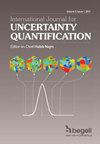利用高斯过程代理进行概率不确定性传播
IF 1.8
4区 工程技术
Q2 ENGINEERING, MULTIDISCIPLINARY
International Journal for Uncertainty Quantification
Pub Date : 2024-05-01
DOI:10.1615/int.j.uncertaintyquantification.2024052162
引用次数: 0
摘要
本文介绍了基于高斯过程回归(也称为克里金)的前向不确定性量化概率框架,该框架操作简单,计算量可控。其目的是在将输入不确定性传播到模拟器输出的过程中,为不确定性度量配备预测不确定性和置信度边界,并考虑到代理模型的有限准确性,这主要是由于使用了有限数量的训练数据。与一些先验模型参数(即趋势系数和核方差)的估算有关的额外不确定性也得到了进一步考虑。我们考虑了两种不同的情况。第一种情况是使用高斯过程代理来模拟实际模拟器,并在蒙特卡罗分析框架内传播输入的不确定性,即以低计算成本替代原始代码。第二种情况是直接根据积分定义,对输出量的统计矩进行半分析估计。第一种情况下的估计值更通用、更简单,而且可以自然扩展到更高维度的输入。我们还讨论了噪声对目标函数的影响。我们的研究结果基于一个简单的示例函数,并通过几个基准函数和一个包含一百多个不确定变量的高维测试案例进行了验证。本文章由计算机程序翻译,如有差异,请以英文原文为准。
Probabilistic Uncertainty Propagation Using Gaussian Process Surrogates
This paper introduces a simple and computationally tractable probabilistic framework for forward uncertainty quantification based on Gaussian process regression, also known as Kriging. The aim is to equip uncertainty measures in the propagation of input uncertainty to simulator outputs with predictive uncertainty and confidence bounds accounting for the limited accuracy of the surrogate model, which is mainly due to using a finite amount of training data. The additional uncertainty related to the estimation of some of the prior model parameters (namely, trend coefficients and kernel variance) is further accounted for. Two different scenarios are considered. In the first one, the Gaussian process surrogate is used to emulate the actual simulator and propagate input uncertainty in the framework of a Monte Carlo analysis, i.e., as computationally cheap replacement of the original code. In the second one, semi-analytical estimates for the statistical moments of the output quantity are obtained directly based on their integral definition. The estimates for the first scenario are more general, more tractable, and they naturally extend to inputs of higher dimensions. The impact of noise on the target function is also discussed. Our findings are demonstrated based on a simple illustrative function and validated by means of several benchmark functions and a high-dimensional test case with more than a hundred uncertain variables.
求助全文
通过发布文献求助,成功后即可免费获取论文全文。
去求助
来源期刊

International Journal for Uncertainty Quantification
ENGINEERING, MULTIDISCIPLINARY-MATHEMATICS, INTERDISCIPLINARY APPLICATIONS
CiteScore
3.60
自引率
5.90%
发文量
28
期刊介绍:
The International Journal for Uncertainty Quantification disseminates information of permanent interest in the areas of analysis, modeling, design and control of complex systems in the presence of uncertainty. The journal seeks to emphasize methods that cross stochastic analysis, statistical modeling and scientific computing. Systems of interest are governed by differential equations possibly with multiscale features. Topics of particular interest include representation of uncertainty, propagation of uncertainty across scales, resolving the curse of dimensionality, long-time integration for stochastic PDEs, data-driven approaches for constructing stochastic models, validation, verification and uncertainty quantification for predictive computational science, and visualization of uncertainty in high-dimensional spaces. Bayesian computation and machine learning techniques are also of interest for example in the context of stochastic multiscale systems, for model selection/classification, and decision making. Reports addressing the dynamic coupling of modern experiments and modeling approaches towards predictive science are particularly encouraged. Applications of uncertainty quantification in all areas of physical and biological sciences are appropriate.
 求助内容:
求助内容: 应助结果提醒方式:
应助结果提醒方式:


